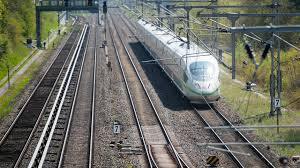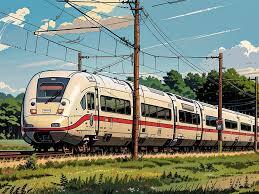The Hamburg-Berlin railway line, a vital link connecting Germany’s two major cities will undergo a significant renovation starting on Friday, August 16, 2024. This marks the beginning of the first phase of upgrades aimed at enhancing the lines reliability, though it won’t result in faster travel times. Here’s what passengers should be aware of regarding the disruptions and adjustments.
Closure Duration
The railway line will be shut down from Friday, August 16, 2024 until Saturday, December 14 2024 when the new schedule comes into effect. This extended closure will greatly impact both long distance and regional travel for four months. The renovation efforts involve replacing, over 74 kilometers of tracks and upgrading 100 switches between Wittenberge and Ludwigslust as well as sections between Hamburg, Büchen, and around Hagenow Land.
Travel Alternatives During Renovations
Throughout the closure period long distance trains will take a detour westward through Stendal, Salzwedel, Uelzen and Lüneburg with stops in these towns along the way. This alternative route will add 45 minutes to travel times. Due to parts of the detour being partly single-track, only one long-distance train per hour will run instead of the usual two. Commuters traveling between Hamburg and Wittenberge can utilize a replacement bus service that also serves Ludwigslust. These updates have already been included in the schedules.
Additional Restrictions
Commencing on Friday August 16, 2024, construction activities will also be carried out between Hamburg and Schwerin until Sunday, September 29 2024. During this time frame there will be no ICE trains operating on this route. Replacement buses will offer a link and one Intercity train per day will travel via Lübeck.
Read also: Construction officially begins on Europe’s latest railway, $4 billion Rail Baltica

Hamburg-Berlin railway line Renovations Impact on Local Transport
The regional train services will see an impact well. The regular route from Hamburg Hbf to Berlin with a transfer in Schwerin will not be available until December 14 2024. Only the alternative route via Bützow will remain accessible. Moreover, the regional train connection from Hamburg-Uelzen –Salzwedel-Stendal-Rathenow-Berlin will face restrictions due to increased demand on long distance trains and a bus substitution service between Uelzen and Salzwedel that lengthens journey times.
Upcoming Renovations
This renovation is not the comprehensive overhaul planned for the Hamburg-Berlin route Deutsche Bahn and the German government have outlined a modernization initiative for more than 40 heavily utilized rail routes. These comprehensive renovations are aimed at enhancing the reliability of the track network thereby improving the overall railway system.
The initial big project, concerning the Riedbahn stretch between Frankfurt and Mannheim has been in progress for a month. Next year crucial adjustments will be made to the Emmerich Oberhausen freight route and the Hamburg Berlin route. A closure is scheduled from August 2025 to April 2026 for track renewals, switch upgrades, overhead line replacements signaling improvements and safety technology enhancements between Hamburg and Berlin. Once this nine month shutdown is completed the line is anticipated to operate for years to come ensuring dependable train services.
Read also: Construction of Budapest-Belgrade Railway Reaches New Milestone
Will Train Speeds Increase After Hamburg-Berlin railway line Renovations?
Despite the renovations taking place Deutsche Bahn has clarified that journey durations will not be shortened. Instead, passengers and freight transport companies will benefit from improved quality and punctuality, with a significant decrease in infrastructure-related disruptions. The focus is on reliability rather than speed.
Why Not Finish All Renovations at Once?
The current state of the railway infrastructure is so dire that certain repairs cannot wait until a comprehensive overhaul is possible. The construction work planned for 2024 is critical, for maintaining existing train speeds and minimizing infrastructure disturbances. While Deutsche Bahn considered combining these works with the overhaul project legal requirements mandate action to meet maintenance deadlines.
The European Union has been instrumental, in pinpointing the Hamburg Berlin railway line for renovation by utilizing its Cooperative Prioritization Process. This railway route holds importance as a cross border transportation link. The EU has provided funding for this project through the Connecting Europe Facility (CEF) an initiative within the EU budget aimed at supporting European infrastructure projects to bolster connectivity among member states, including Germany.
As these renovations unfold there is optimism that Germany’s rail network will progressively improve in reliability despite passengers experiencing disruptions, during the construction phase.
Read also: Connecting Europe: The European-Gauge Railway Lays Down its First Tracks as Construction Commences

Leave a Reply